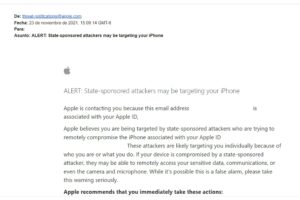Ghana finally shows up on Pegasus phone hack list
 In July this year, journalism organisation, Forbidden Stories led a collaboration involving 17 media organisations around the world in a groundbreaking investigation with Amnesty International that for the first time established the extent to which the Pegasus software, an invasive product from Israeli tech company, NSO Group that has the capacity to jailbreak any device, take control of it without the user’s knowledge or action, and spy on them has been used on politicians, activists and journalists around the world.
In July this year, journalism organisation, Forbidden Stories led a collaboration involving 17 media organisations around the world in a groundbreaking investigation with Amnesty International that for the first time established the extent to which the Pegasus software, an invasive product from Israeli tech company, NSO Group that has the capacity to jailbreak any device, take control of it without the user’s knowledge or action, and spy on them has been used on politicians, activists and journalists around the world.
The Forbidden Stories collaboration from leaked documents showed that more than 50,000 phone records were selected as targets by clients of NSO Group for surveillance around the world, including journalists.
Analysis of the records showed that the phones of at least 180 journalists were selected in 20 countries by at least 10 NSO clients. But that number has now gone up.
In a tweet yesterday November 25, 2021, Forbidden Stories said they have tallied at least 28 more journalists have been hacked, in six countries including Ghana. The tweet was in response to a lawsuit filed by Apple against NSO Group and its parent company, OSY Technologies.
“Again and again. The no. of spyware victims continues to grow since the #PegasusProject. Per our tally, at least 28 journalists were notified by Apple that they were potential targets of “state sponsored attackers” in El Salvador, Lebanon, Bahrain, Ghana, Uganda, & South Africa,” the group tweeted.
Again and again. The no. of spyware victims continues to grow since the #PegasusProject.
Per our tally, at least 28 journalists were notified by Apple that they were potential targets of “state sponsored attackers” in El Salvador, Lebanon, Bahrain, Ghana, Uganda, & South Africa. pic.twitter.com/KNREmUigGl
— Forbidden Stories (@FbdnStories) November 25, 2021
This raises questions about constant denials by the former government officials connected to the transaction that the country didn’t have the software, which is an indication that it was never used in Ghana. But this tweet from Forbidden Stories now negates every denial and establishes the fact that the software has indeed, been used in Ghana. Details would come out soon.
Following the Forbidden Stories publications, the US Commerce Department’s Bureau of Industry and Security (BIS) blacklisted NSO Group, and soon after the blacklist, NSO’s incoming CEO, Isaac Benbenisti, who had been co-president, resigned days after his appointment, and Apple has sued the company for allegedly targeting iPhone users with a hacking tool.

In the suit Apple filed in the US District Court of the Northern District of California, Apple said NSO’s tools were used in “Concerted efforts in 2021 to target and attack Apple customers,” and that “US citizens have been surveilled by NSO’s spyware on mobile devices that can and do cross international borders.”
Apple alleges that NSO Group created more than 100 fake Apple ID users’ credentials to carry out the attacks.
While Apple notes that its servers were not attacked, it indicated that the servers were misused and manipulated and used in attacks on Apple customers.
Apple sent the following alert to the targeted customers:
State-Sponsored attackers may be targeting your iPhone
ALERT: State-sponsored attackers may be targeting your iPhone
Apple is contacting you because this email address associated with your Apple ID.
Apple believes you are being targeted by state-sponsored attackers who are trying to remotely compromise the iPhone associated with your Apple ID.
These attackers are likely targeting you individually because of who you are or what you do. If your device is compromised by a state-sponsored attacker, they may be able to remotely access your sensitive data, communications, or even the camera and microphone. While it’s possible this is a false alarm, please take this warning seriously.
Apple recommends that you immediately take these actions:
Ghana is a customer of NSO Group. The country has bought the hardware for Pegasus, an action for which some former government appointees have been jailed. But for almost a year after the case went to court, the Ghanaian media, even though was covering the court case had no idea the transaction in question was linked to the Pegasus software, classified as a weapon. Authorisation has to be received from the Israeli Defence Ministry before the software can be sold. Until Ghana Business News did a story exposing that fact, it wasn’t known in Ghana that the country had signed up for the software.
By Emmanuel K. Dogbevi
Copyright ©2021 by NewsBridge Africa
All rights reserved. This article or any portion thereof may not be reproduced or used in any manner whatsoever without the express written permission of the publisher except for the use of brief quotations in reviews.
